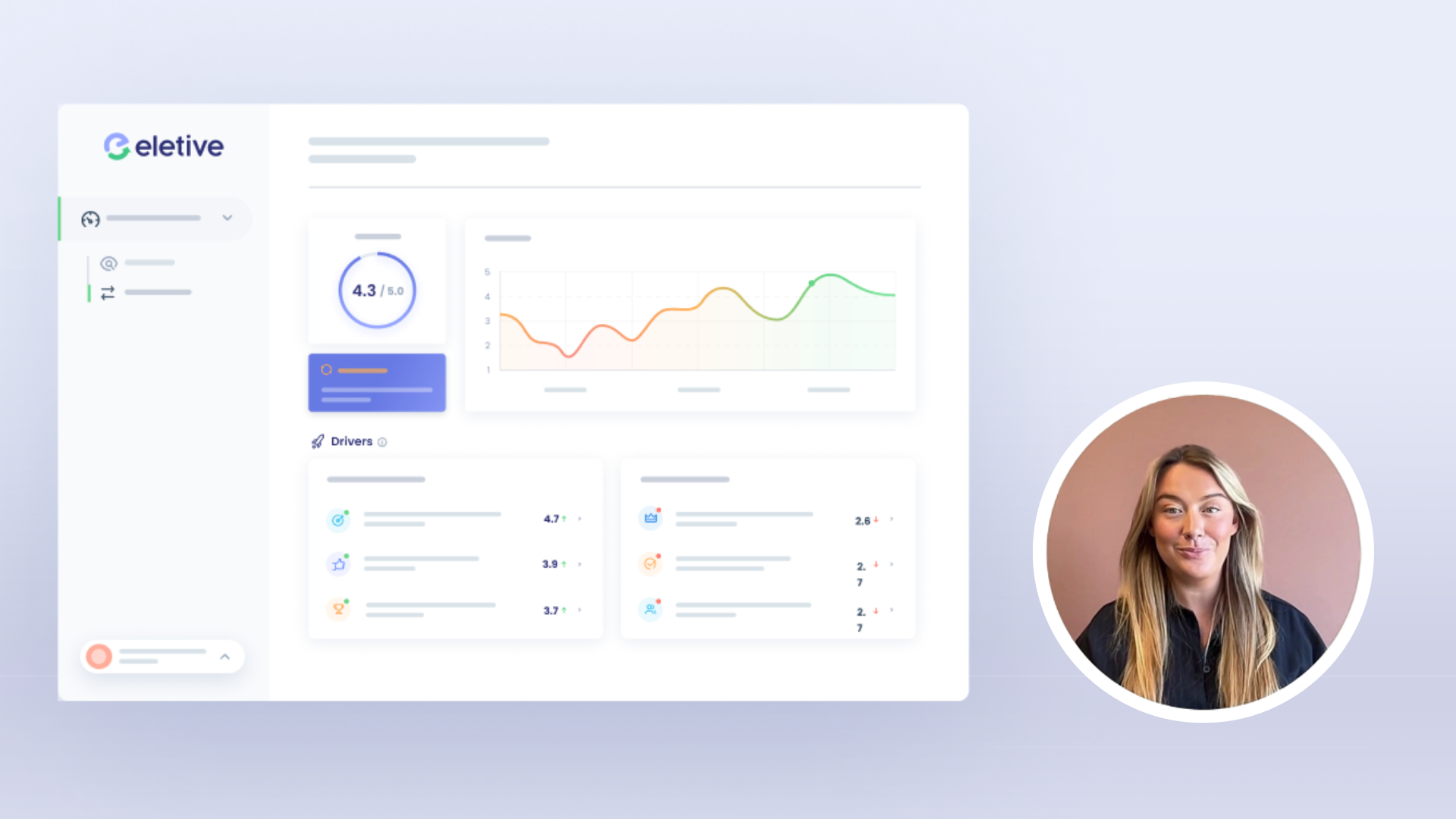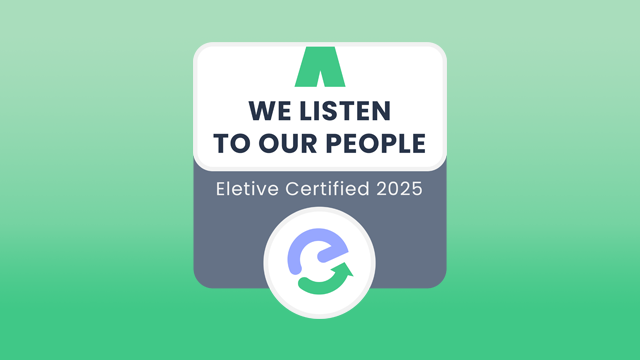In times of economic uncertainty, such as a recession, the workplace can become a source of stress and anxiety for employees. However, prioritising the well-being and psychological safety of the workforce is crucial.
In this webinar we examine the significance of psychological safety for employee well-being, productivity, and organisational resilience. Watch the webinar co-hosted with Assessio, featuring industry experts Johanna Linwert Lannér, Head of People Experience at Eletive, and Elise Nathansson, Customer Success Manager and Psychologist at Assessio.
Webinar hosted by Assessio & Eletive
The aim with the webinar is to guide the audience in how to create psychological safety in the work environment. The world is changing, and it affects all of us. It doesn't matter where we're from, what industry we're in, or our culture. Tough times affect employees all over the world, hence we need to make sure to help employees feel psychologically safe.
For example the war in Ukraine has caused economic inflation, Chat GPT has caused resignation in several industries. These are just a few examples emphasizing the importance of psychological safety in the workplace. In the next six months, it is hard to know what will happen. Therefore, it is essential to prioritise psychological safety in the workplace and as part of every business culture. Watch webinar:
Definition of psychological safety
Psychological safety is a critical factor in the workplace, especially during a recession.
It refers to creating an environment where individuals feel secure and can freely express themselves, take risks, and contribute their best work without the fear of negative consequences.
Renowned Harvard professor Amy Edmondson has extensively researched psychological safety, defining it as a workplace where people feel safe to speak up with ideas, concerns, and mistakes. The webinar panellists, Johanna and Elise, agree with this definition, emphasising the importance of employees feeling that their voices are valued.
Research of psychological safety at Google
A notable example of the impact of psychological safety is Google's research conducted in 2015. The study revealed that psychological safety played a crucial role in successful teams. Employees who feel psychologically safe are more likely to speak up, share ideas, provide feedback, and exhibit creativity, innovation, and problem-solving skills. Moreover, psychological safety enhances engagement and motivation, contributing to a positive work environment.
"Research has shown that creating a psychologically safe workplace is essential for building high-performing teams and organisations. Creating a positive workplace environment is key for fostering successful teams and organisations."
- Elise Nathanson
Addressing job insecurity during a recession
Recessions often trigger job insecurity and anxiety among employees. Fostering psychological safety can help alleviate these concerns by establishing an open and transparent communication culture. Regular updates on the organisation's financial situation, opportunities for employees to express concerns, and honest dialogue can significantly reduce anxiety levels. By creating an environment of support and providing well-informed communication, organisations enable employees to cope with uncertainties and focus on their work.
Measuring psychological safety at work
There are several different ways to measure psychological safety. Amy Edmondson herself has created a tool that's called the Fearless Organisation Scan. It is also possible to find a lot of questionnaires just by googling on "questionnaire psychological safety".
It's also most likely possible to use your current employee survey or pulse survey tool to measure psychological safety in your organisation. Employee surveys will most likely have drivers and sub-drivers, and different questions will provide you answers and insights that can be connected to psychological safety.
Measuring psychological safety with employee surveys
With Eletive, there are several drivers and sub-drivers that are connected to psychological safety.
For example, one of the drivers is called Meaningfulness and Participation. Asks for questions about new ideas and diverse opinions are welcomed in my workplace or my opinions matters in my workplace. A high score of the sub-drivers indicates a positive internal climate, signifying that individuals feel comfortable and secure enough to express their opinions openly and freely.
The next crucial driver is Relationship with Managers, which holds great importance. It involves questions like whether my manager values my opinions, trusts me, and has confidence in my abilities.
Additionally, Relationship with Colleagues can serve as a measurement of psychological safety. It extends beyond just the manager's reaction to ideas or opinions; it encompasses how colleagues respond during meetings. It is essential to foster an environment where individuals feel respected and not subjected to dismissive gestures or eye-rolling.
Furthermore, Feedback and Communication contribute significantly to identifying a psychologically safe environment. A high score in this area indicates that feedback is valued and appreciated in the workplace. This kind of feedback helps coworkers to grow and develop both personally and professionally.
Measuring these drivers is an integral part of understanding and assessing the level of psychological safety within an organisation.
Actions to implement at work during recession:
To be able to create a psychologically safe environment in your organisation, you need to understand it's core definition. Furthermore you need to measure the level of psychological safety, and lastly you need to take action on the survey data and implement actions to boost psychological safety in your organisation. Here are some examples of actions that can be implemented to increase psychological safety in the workplace:
Encourage open communication: Create an environment where everyone feels comfortable expressing their thoughts and ideas without fear of judgment or retribution. Encourage active listening and provide opportunities for all team members to contribute.
Leaders should set an example. They should demonstrate behaviours that encourage psychological safety, such as admitting mistakes, asking for feedback, and showing respect. This will create a positive environment and help to build trust. When leaders are open and vulnerable, it encourages others to do the same.
Establish clear expectations: Clearly communicate expectations regarding behaviour, performance, and conduct. This helps to set a foundation of trust and provides a framework for appropriate interactions within the team.
Foster a learning mindset: Emphasise learning and growth over blame and punishment. Encourage experimentation and view mistakes as opportunities for improvement rather than as failures. Celebrate and recognize efforts and progress.
Implement anonymous feedback channels: Offer avenues for anonymous feedback, such as suggestion boxes or online surveys. This allows individuals to express their concerns or share ideas without fear of retaliation.
Provide constructive feedback: When providing feedback, focus on specific behaviors and their impact rather than attacking the person. Use a growth-oriented approach to help individuals understand how they can improve without feeling attacked or criticised.
Encourage collaboration: Foster a culture of teamwork and collaboration, where individuals feel comfortable asking for help and supporting each other. Promote the idea that everyone's input is valued and necessary for success.
Address interpersonal conflicts promptly: Address conflicts or tensions within the team promptly and impartially. Provide a safe space for individuals to express their concerns and mediate discussions to find resolutions that benefit everyone involved.
Offer resources for mental well-being. Provide access to counseling services, stress management workshops, and mindfulness training. Support mental health with these resources. Show that the organisation values and prioritises the well-being of its employees.
Regularly assess and review progress: Continuously evaluate the effectiveness of initiatives aimed at increasing psychological safety. Collect feedback from employees, conduct surveys, and make necessary adjustments to ensure ongoing improvement.
Remember, psychological safety is an ongoing process that requires commitment and effort from both leaders and team members. Implement these actions to create a supportive and inclusive work environment. This will help individuals feel safe to take risks, contribute ideas, and grow professionally.
Building trust and collaboration
Psychological safety nurtures trust and collaboration within teams, facilitating effective cooperation. Encouraging employees to freely express opinions and challenge existing practices promotes a culture of innovation and inclusion. By valuing diverse perspectives, organisations unlock the full potential of their workforce, enabling them to adapt to changing economic conditions and devise innovative solutions.
Encouraging risk-taking and learning
In psychologically safe workplaces, employees are more willing to take risks, experiment with new ideas, and learn from failures. This mindset becomes particularly crucial during a recession, as organisations need to be agile and adaptable. Cultivating a culture of calculated risk-taking empowers employees to contribute ideas and solutions without fear of retribution. It encourages continuous learning, experimentation, and adaptation, positioning organisations to navigate challenging economic conditions effectively.
Enhancing employee well-being and resilience
Psychological safety plays a vital role in promoting employee well-being and resilience during a recession. When employees feel psychologically safe, they are more likely to seek support when facing personal or professional challenges. Organisations can provide resources like counselling services, stress management programs, and flexible work arrangements to support employees.
The importance of recognising psychological safety
In the face of a recession, organisations must recognise the importance of psychological safety. Organisations can create a resilient workforce by fostering an environment that encourages open communication, trust, risk-taking, and employee well-being. This will enable the workforce to navigate uncertainty and thrive in difficult times.
Prioritising psychological safety not only benefits employees but also enhances organisational performance and positions the company for long-term success. Navigating a recession can be complex. Let us remember that nurturing psychological safety is a worthwhile investment. It will result in engaged employees, innovation, and a stronger organisational culture.
The importance of 1-on-1s and anonymous comments
1-on-1 meetings and anonymous comments in employee engagement tools can both play a significant role in boosting psychological safety at work. Here's how each of these approaches contributes to creating a psychologically safe environment:
1-on-1 meetings
Trust-building: Regular 1-on-1 meetings between employees and their managers provide a dedicated space for open and honest conversations. When managers actively listen, provide support, and demonstrate empathy, employees feel valued and heard. This fosters trust and contributes to a sense of psychological safety.
Feedback and growth: In 1-on-1 meetings, managers can provide constructive feedback and guidance tailored to individual employees' needs. When feedback is delivered in a supportive and non-judgmental manner, it encourages employees to take risks, share their ideas, and collaborate more freely.
Problem-solving: 1-on-1 meetings can also be used to address any issues or challenges that employees might be facing. When employees feel comfortable discussing problems with their managers and trust that they will receive support, it reduces fear and anxiety, and promotes a psychologically safe work environment.
Anonymous comments
Encourages open expression: Providing anonymous comment features in employee engagement tools allows employees to share their thoughts and opinions without the fear of repercussions or judgment. This anonymity empowers individuals who may otherwise hesitate to speak up due to power dynamics, fear of conflict, or social pressure.
Diverse perspectives: By enabling anonymous comments, organizations can access a wider range of perspectives. Employees who might be hesitant to share their views openly can contribute valuable insights and ideas. This inclusivity promotes psychological safety by ensuring that everyone's voice is heard, regardless of their position or level of confidence.
Feedback culture: Anonymous comments can foster a feedback culture by encouraging employees to provide honest feedback on various aspects of the work environment, such as processes, policies, or leadership. This feedback, when acted upon constructively, demonstrates that opinions are valued, encourages continuous improvement, and reinforces the idea that it's safe to express one's thoughts and concerns.
Combining 1-on-1 meetings and anonymous comments in employee engagement tools creates multiple avenues for employees to voice their opinions, seek support, and provide feedback. These practices nurture psychological safety, as employees feel more comfortable expressing themselves, taking risks, and engaging in open dialogue without fear of negative consequences.
Eletive - Uniting technology and psychology
The Eletive journey began in 2014 when three friends, two engineers and one psychologist, engaged in discussions about organisational behaviour and management theory. They collectively recognized the flaws in how most organisations approached employee engagement and performance, and they firmly believed that a better approach was possible. They envisioned a method that would involve all stakeholders within the organisation: HR, managers, and employees. This method would be rooted in scientific research, blending the power of technology with the insights of psychology and behavioural science.
Since its launch in late 2014, Eletive has been dedicated to enhancing employee engagement, cultivating exceptional leadership, and freeing up HR's time to focus on coaching managers and teams. We firmly believe that decisions regarding people should be based on up-to-date, real-time insights, and that every employee possesses self-leadership potential. Our goal is to foster a healthy and thriving company culture where everyone is included in the decision-making process. This unique approach has positioned our platform as a pioneer in its field.
Curious about Eletive? Welcome to contact us

























:format(jpeg)/f/288714721386412/23f4213ba9/blog-webinar-the-business-impact-of-employee-engagement-hero_media.jpg)
:format(png)/f/288714721386412/70a5012076/blog-eletive-secures-growth-investment-from-accel-kkr-hero_media.png)
:format(jpeg)/f/288714721386412/a906f14dff/blog-hr-trends-2026-ai-data-and-employee-experience-hero_media.jpg)
:format(png)/f/288714721386412/9f8e0a2347/blog-beyond-the-hype-the-new-rules-of-people-success-in-a-global-ai-powered-hero_media.png)